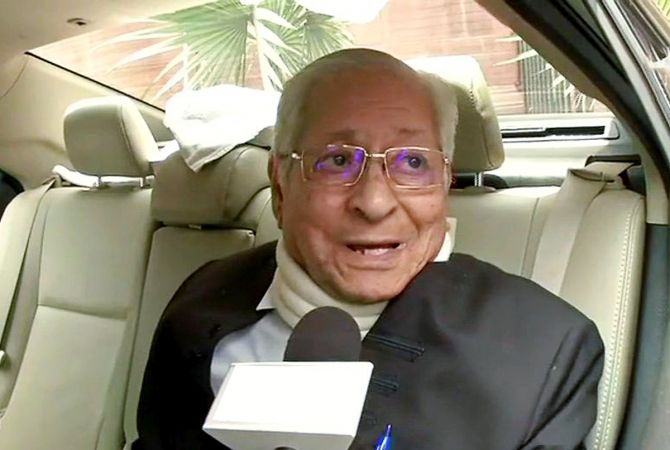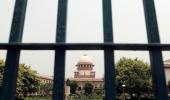'Soli steadfastly believed in Voltaire's famous dictum that he would disagree violently with anyone but defend to death that person's right to disagree with him.'
Aditi Phadnis remembers Soli Sorabjee, who passed into the ages this week.

Senior Advocate at 41, twice attorney general, and a committed defender of freedom of expression and the protection of human rights, Padma Vibhushan Soli Sorabjee died of COVID-19-related complications at 91.
He dedicated his life to the service of law -- and jazz, a genre of music he loved with a passion.
Sorabjee (March 9, 1930-April 30, 2021) worked with legal luminaries like Nani Palkhivala (as his junior). Of Palkhivala, he said: 'I vividly remember the early morning conferences the two of us had those days in his room at the Oberoi Hotel. Both of us were in our pyjamas.
'At one such conference, I nervously suggested the argument about inherent limitations on the amending power based on certain articles in the US law journals. He grasped the point, but was not quite convinced. A few hours later in the Supreme Court, he expounded the doctrine brilliantly.'
The same could be said of Sorabjee (though pyjamas might not have figured).
In a tribute, his junior, Abhishek Manu Singhvi, said that before Special Leave Petition hearings, juniors would be asked to brief him for a maximum of 10 minutes, 'usually dissatisfied with his degree of understanding and absorption and alarmed at the last-minute conference a few minutes before court started. And then he would astonish us with his dexterity inside the court, his nimbleness with the point at issue, repeatedly hitting the nail on the head when questioned by the court and usually carrying the day.'
Sorabjee was one of the lawyers who argued and won the Kesavananda Bharati versus State of Kerala case that had a profound impact on Constitutional law.
Many argue that the verdict saved democracy in India by preserving the concept of the supremacy of the Constitution and putting to rest the British concept of parliamentary supremacy.
In one of his newspaper columns, Sorabjee recalled how he clashed with another brilliant Constitutional lawyer but respected colleague H M Seervai (he notes that throughout his life, Seervai never called him Soli but Sorab, for reasons he didn't entirely understand).
'Considerable heat was generated in the Supreme Court when Seervai derided our arguments about the basic structure of the Constitution, he wrote, but added that Indira Gandhi's imposition of the Emergency was later criticised by Seervai in unambiguous terms.
Another landmark case among the many he fought was the S R Bommai case that laid down the template that in a dispute, a decision on a majority of a government in power needed to be tested on the floor of the House, not in the Raj Bhavan.
More recently, he made it clear that he stood with the judgment decriminalising Article 377.
He wrote: 'In essence homosexuality has not been legalised, much less advocated or championed. It has been decriminalised with the salutary consequence that the police will not be able to barge into a person's bedroom and terrorise him or her with arrest and criminal prosecution with all the attendant trauma and stigma unless the extortionate demands of the police are met.
'It is well known that Section 377 had become an instrument for harassment and blackmail. The judgment rightly removes the stigma that a gay person is a criminal or an immoral person. The real merit of the judgment lies in its recognition that intimacies, privacies and autonomies of human life and the right of an individual to make choices, which does not harm or infringe the rights of other persons, cannot be criminalised.'
Another landmark case was the 2012 Supreme Court petition of law student Shreya Singhal, asking for Section 66A in the Information Technology Act, 2000 to be taken off the statute books that Sorabjee fought when Mukul Rohatgi became attorney general.
'Despite possessing a different political persuasion, Soli steadfastly believed in Voltaire's famous dictum that he would disagree violently with anyone but defend to death that person's right to disagree with him,' said Singhvi.
He could be seen at the India International Centre frequently, where he was president twice, and used the IIC lawns to organise, along with other jazz lovers, the Jazz Yatra (1978-2003), an international festival of jazz.
His affection for jazz began in college when he floated his own band, the SS (Soli Sorabjee) Quartet. He explored the genre further and records that he fell in love with it almost by accident -- when, instead of a recording of Brahms, a shopkeeper sold him a Benny Goodman album. Moonglow, the American clarinetist's famous tune, was one of his favourites.
He also loved literature: Shakespeare's sonnets and the Victorian poets.
Singhvi says he was a brilliant mimic, and sometimes wicked with the gift -- something hard to imagine from someone as courtly as Sorabjee. Above all, he was a believer in humanism, civil liberties and all things of beauty.











